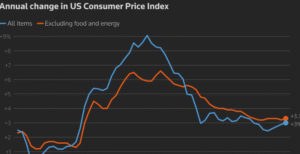$XOM $CVX $OXY
#Oil #Energy #Markets #Stocks #Investment #Economy #Crude #Petroleum #USA #Business #Finance #IPAA
Independent Petroleum Association of America (IPAA) President & CEO Jeff Eshelman has made a statement ahead of U.S. President Donald Trump’s address to Congress, highlighting the ongoing historic shifts in the energy industry. As oil markets continue to adjust to supply and demand fluctuations, and as regulatory frameworks shift in response to new policies from the Trump administration, the sector is poised for both opportunities and challenges. Eshelman underscored the importance of a balanced regulatory environment that promotes energy independence while ensuring economic stability, signaling potential implications for oil producers and investors looking for clarity on energy policy direction.
The energy sector has experienced considerable volatility in recent years, with crude prices influenced by global production levels, geopolitical tensions, and technological advancements like hydraulic fracturing and horizontal drilling. Under the Trump administration, the deregulation of certain aspects of the oil and gas industry has been central to fostering domestic production, boosting upstream activity. Oil giants such as ExxonMobil ($XOM) and Chevron ($CVX) have continued to adjust their strategies, investing in robust exploration efforts and expanding refining capacities, as they anticipate policies that favor growth in U.S. energy production. Smaller and mid-sized independent producers, represented by organizations like IPAA, are advocating for regulatory reforms that provide a more predictable framework, reducing compliance costs and encouraging further investment into domestic energy projects.
Financial markets have closely tracked these regulatory changes, with oil and gas stocks responding to shifting expectations regarding production levels and energy demand forecasts. Investors are weighing the impact of global crude price movements, in addition to domestic fiscal policies that could shape the investment landscape. West Texas Intermediate (WTI) and Brent crude benchmark prices remain central indicators for the market, influencing investment decisions in oil-related equities. As U.S. producers aim to capitalize on favorable policies under the Trump administration, there is potential for increased production, which could weigh on prices if demand does not keep pace. However, adjustments in OPEC production levels and international demand from emerging markets remain critical factors in determining crude oil’s supply-demand balance.
With President Trump set to address Congress, market participants are expecting signals regarding his administration’s broader economic agenda, including corporate tax reforms and infrastructure initiatives that could have ripple effects on the energy sector. Investors will be closely watching for indicators of how federal energy policies will be structured moving forward, particularly regarding drilling permits, environmental regulations, and incentives for domestic energy producers. Given the energy sector’s significant role in job creation and economic growth, any policy statements affecting oil and gas exploration, pipeline developments, and trade agreements will be pivotal in shaping the trajectory of the market. The IPAA’s statement highlights the key issues facing independent producers, as they seek policy clarity to navigate an evolving landscape that will define the future of U.S. energy independence and competitiveness.










Comments are closed.